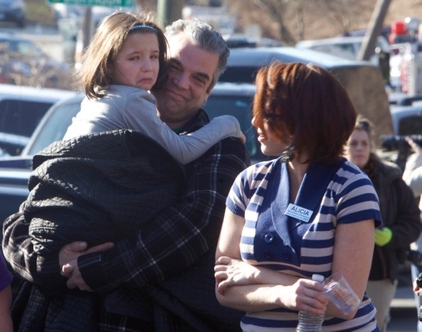I didn’t find out about the Sandy Hook shootings until Friday at 3 pm, when I entered my class at FIT to find my students listening to President Obama’s brief address on YouTube. I let them listen, then turned it off.
Later I wondered why I had been in such a rush (not that they minded, it turned out; they’d probably been “processing”, as educators like to say about the un-process-able, all day.) And later I looked at the photos of parents hugging and carrying off the children that did survive and cried. However terrible those parents must have felt about what happened to the other children, it couldn’t have been equal to their relief that their own child was spared.
MICHELLE MCLOUGHLIN/REUTERS
That’s the thing about love: equanimity has nothing to do with it. Your own child matters more to you than 20 of someone else’s. And that’s where the law comes in: it is supposed to protect the polity from fierce biases. Everyone’s child gets to live.
But too many Americans have their particularities and their generalities mixed up. They think the law should protect our individual freedoms more than our collective rights. And a symptom of that confusion is not only insisting on your average maniac’s right to bear arms but also the mass mourning we go in for. We take mass action not for what it is good for–large, gross necessities–but for delicate and differentiated feeling. In America we have a ghoulish habit of mourning vicariously, which both obscures the pain of those closely involved and makes us feel we are doing something.
Let the families do the mourning. The rest of us should be shocked and angry–thwarted enough from easy expressions of sympathy to be pressed to act and protest–at the senselessness of these children’s deaths. No one outside the military (I’ll leave inside for another day) should have access to a semi-automatic rifle that can fire seven shots a second and has hundreds of bullets ready in its magazine. The children’s bodies were riddled with bullets.

